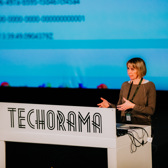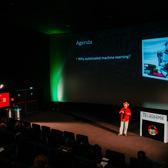Developing AI-Powered Apps with C# and Azure AI
UADAI
4 days
Interested in a private company training? Request it here.
Not ready to book yet? Request an offer here.
What is Artificial Intelligence?
In this chapter you will get a short overview about what AI is exactly, and what we can do with it.
- Definitions of Artificial Intelligence
- Machine Learning Basics
- Domains of Artificial Intelligence
- AI vs ML Engineering
- History, Current State and Future
Introduction to Microsoft Foundry
Microsoft Foundry is a comprehensive platform that streamlines AI solution development and deployment. In this chapter, discover how to use hubs for building and testing AI solutions, projects for grouping and deploying AI apps, and tools for managing resources, all while ensuring responsible AI practices are followed.
- What is Microsoft Foundry?
- Collaborative AI Development
- Deploying AI Applications with Projects
- Managing Resources and Projects
- LAB: Creating a Microsoft Foundry Project
Ready-to-Use AI Models with Azure AI Services
Azure AI services provides a comprehensive suite of out-of-the-box and customizable AI tools, APIs, and pre-trained models that detect sentiment, recognize speakers, understand pictures and many more. Microsoft Foundry brings together these services into a single, unified environment.
- Azure AI Services Overview
- Azure AI Language
- Azure AI Vision
- Azure AI Speech
- Azure AI Document Intelligence
- LAB: Creating an AI Powered Insurance Claim Processor
Azure OpenAI and Large Language Model Fundamentals
This module introduces Azure OpenAI and the GPT family of Large Language Models (LLMs). You'll learn about available LLM models, how to configure and use them in the Azure Portal, and the Transformer architecture behind models like GPT-4o. The latest GPT models offer Function Calling, enabling connections to external tools, services, or code, allowing the creation of AI-powered Copilots. Additionally, you'll discover how Azure OpenAI provides a secure way to use LLMs without exposing your company's private data.
- Introducing OpenAI and Large Language Models
- The Transformer Model
- What is Azure OpenAI?
- Configuring Deployments
- Understanding Tokens
- LLM Pricing
- Azure OpenAI Chat Completions API
- Role Management: System, User and Assistant
- Azure OpenAI SDK
- Extending LLM capabilities with Function Calling
- LAB: Deploying and Using Azure OpenAI
Processing Different Modalities with LLMs
Text is no longer the only way to interact with Large Language Models. In this chapter, you will explore the multimodal capabilities of modern models like GPT-5, which allow you to reason across audio, vision, and text. You will learn how to integrate computer vision directly into your chat flow to analyze images and incorporate voice capabilities using Text-to-Speech and Speech-to-Text models.
- Introduction to Multimodal Large Language Models
- Vision with GPT Models: Chatting with your Images
- Visual Prompting Techniques
- Processing Audio: Speech-to-Text and Text-to-Speech
- LAB: Building a Voice-Enabled Visual Analysis App
Modern .NET AI Development with Microsoft Extensions AI
Microsoft Extensions AI is a set of core libraries providing a unified layer of abstractions for interacting with AI services. It enables developers to integrate Large Language Models (like OpenAI, Azure OpenAI, or local models via Ollama) into .NET applications using consistent, standardized interfaces. This package focuses on composable building blocks, allowing you to easily chain middleware for logging, caching, and telemetry while interacting with your custom code.
- An Introduction to Microsoft Extensions AI
- Unified Integration with AI Interfaces
- Monitoring Costs and Token Usage
- Invoking Code with Tool Calling
- Modifying Behavior with AI Middleware
- Dependency Injection for AI Services
- Observable AI Apps with OpenTelemetry
- LAB: Create a Natural Language to SQL Translation Copilot
Model Context Protocol (MCP): Standardizing LLM Integrations
This chapter explores the Model Context Protocol (MCP), an open standard revolutionizing how applications provide context to LLMs. MCP acts as a 'USB-C for AI,' standardizing connections between LLMs and various data sources or tools. Crucially, MCP empowers companies to define, once and for all, precisely how their proprietary data and tools are utilized by AI systems.
- What is the Model Context Protocol (MCP)?
- Understanding MCP's Core Components: Hosts, Clients and Servers
- Defining MCP Prompts, Tools and Resources
- Building MCP Servers with C#
- LAB: uilding MCP Servers and Client with C#
Retrieving Semantically Related Data with Vector Search
Vector search is a powerful technique that allows you to retrieve semantically related data from large datasets such as company documents or databases. This chapter will teach you how vector search works and how it enables you to find relevant information without depending on exact keyword based search terms or language of the information in the dataset.
- Capture Semantic Meaning with Embeddings
- Vector Search
- Vector Search Design Considerations
- LAB: Using Vector Embeddings and Semantic Search
Retrieval Augmented Generation with Azure AI Search
Azure AI Search enables the Retrieval Augmented Generation (RAG) design pattern, enhancing LLMs knowledge with your own company specific data. This chapter explores the RAG design pattern by incorporating Azure AI Search, into your Semantic Kernel Python applications.
- What is Azure AI Search?
- Retrieval Augmented Generation with Semantic Kernel
- Enhancing AI Models with your Own Data: Blob Storage, Azure SQL, OneLake...
- Hybrid Search with Semantic Reranking
- Use AI Enrichment to extract insights
- Fine-tuning vs RAG
- LAB: Chat with Azure OpenAI models using your own data
Prompt Engineering and Design Patterns
In this chapter, you'll explore advanced techniques allowing you to control the model's output, transforming generic responses into precise, valuable results. Additionally the chapter covers emerging design patterns in the field of Gen AI app development that help you increase quality of model responses and reduce costs.
- What is Prompt Engineering?
- Few-Shot Prompting
- Structured Query Generation
- Verifying Model responses with Hallucination Detection
- LLM orchestration patterns
- Saving costs with Semantic Caching
Building Agentic AI Systems with Microsoft Agent Framework
This chapter introduces the fundamentals of building agentic AI systems, with a focus on the Microsoft Agent Framework. You will learn what agents are, when they are the right architectural choice, and how the Agent Framework helps structure agent behavior using models, tools, instructions, and memory. The chapter also explores the internal reasoning loop of an agent and emphasizes the importance of guardrails, safety, and human-in-the-loop oversight for building reliable and responsible agent-based solutions.
- Introduction to Agentic AI Systems
- Identifying Ideal Use Cases for Agents
- Core Principles of Agent Design (Models, Tools, Instructions)
- Building Agents with the Microsoft Agent Framework
- Understanding the Agent Reasoning Loop
- Implementing Guardrails for Safe and Reliable Agents
- Integrating Human Oversight and Intervention Strategies
- LAB: Building a SQL Agent
Multi-Agent Systems with Microsoft Agent Framework Workflows
How do you scale AI solutions from single-purpose agents to complex, collaborative business processes? This chapter shifts focus to Microsoft Agent Framework Workflows, exploring how to orchestrate multiple agents within strongly-typed, graph-based structures. You will discover how to distinguish between dynamic agent behaviors and defined workflow execution paths, manage long-running processes with checkpointing, and implement powerful multi-agent patterns-such as Group Chat and Magentic-to solve multifaceted problems that exceed the capabilities of a single agent.
- Differentiating AI Agents from Deterministic Workflows
- Core Concepts: Executors, Edges, and Graph-Based Logic
- Building Robust Systems with Type Safety and Checkpointing
- Multi-Agent Orchestration Patterns
- Implementing Sequential and Concurrent Agent Workflows
- Advanced Collaboration: Group Chat and Handoff Strategies
- Solving Complex Tasks with the Magentic Pattern
- LAB: Orchestrating a Multi-Agent Group Chat
Testing and Moderating AI Models with Microsoft Foundry
How can you ensure an LLM provides relevant and coherent answers to users' questions using the correct info? How do you prevent an LLM from responding inappropriately? Discover the answers to these questions and more by exploring evaluation metrics in Microsoft Foundry and the Azure AI Content Safety Service. Additionally, learn how to simplify quality and safety assessments in your .NET intelligent apps using the Microsoft.Extensions.AI.Evaluation libraries.
- Ensuring Coherent and Relevant LLM Responses
- Utilizing Correct Information in AI Answers
- Using Microsoft Foundry's built-in Evaluators
- Preventing Inappropriate LLM Responses
- Leveraging Azure AI Content Safety Service
- Implementing Code-Based Evaluations with Microsoft.Extensions.AI
- Enhancing AI Performance and Safety
- LAB: Evaluating the Performance of a RAG App
Deploying AI Models on Microsoft Foundry
The cost and quality of your AI-powered app depend largely on your choice of AI model and how you deploy it. Learn about the available model catalog, featuring state-of-the-art Azure OpenAI models as well as models from Anthropic, Hugging Face, Meta, Google, Microsoft, Mistral, and many more.
- Model Catalog Overview
- Model Benchmarks
- Selecting the Best Deployment Mode
- LAB: Deploying an Open Source AI Model on Microsoft Foundry
Working with Open-Source Language Models
This chapter empowers you to bring powerful AI capabilities to end-user environments like mobile devices, personal computers and browsers, enhancing scalability, costs and performance. Additionally you will learn how to deploy and host your own open-source Language Models in the form of an API that you have full control over.
- The Phi-3 Family of Small Language Models
- Deploying AI Models on Mobile and Edge Devices with ONNX Runtime
- Hosting and Deploying Language Models on-prem and in the cloud with Ollama
Fine-tuning AI Models with Microsoft Foundry
This chapter explores the advantages of fine-tuning pre-trained LLMs for higher accuracy and customized behavior compared to Retrieval Augmented Generation (RAG). While RAG offers dynamic updates and cost-effectiveness, fine-tuning provides superior precision for specialized tasks, making it ideal for achieving domain-specific results.
- Introduction to Fine-Tuning LLMs
- How to decide between Fine-Tuning and RAG?
- Using Task-Specific Data for Enhanced Performance
- Reducing Hallucinations with Fine-Tuning
In this course, you will learn to seamlessly integrate pre-built AI services and Large Language Models such as OpenAI's GPT models and Phi into your .NET apps. You will become familiar with Microsoft Foundry, Microsoft's unified portal for managing, testing, moderating and deploying AI models. The course will teach you how to use your own data with Large Language Models using Azure AI Search. Furthermore, you will gain hands-on experience with AI libraries such as Microsoft Extensions AI and Microsoft Agent Framework. This course will equip you with the skills to integrate advanced AI capabilities into your software solutions without needing to be a data scientist.
This course targets professional C# developers that want to get started with the Microsoft AI platform, now known as Microsoft Foundry. Participants of this course need to have a decent understanding of C#. This is not a course for data scientists who want to build their own AI models or understand how existing AI models work.











